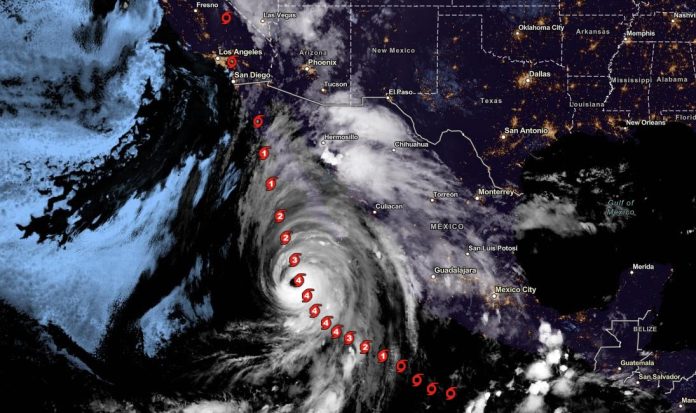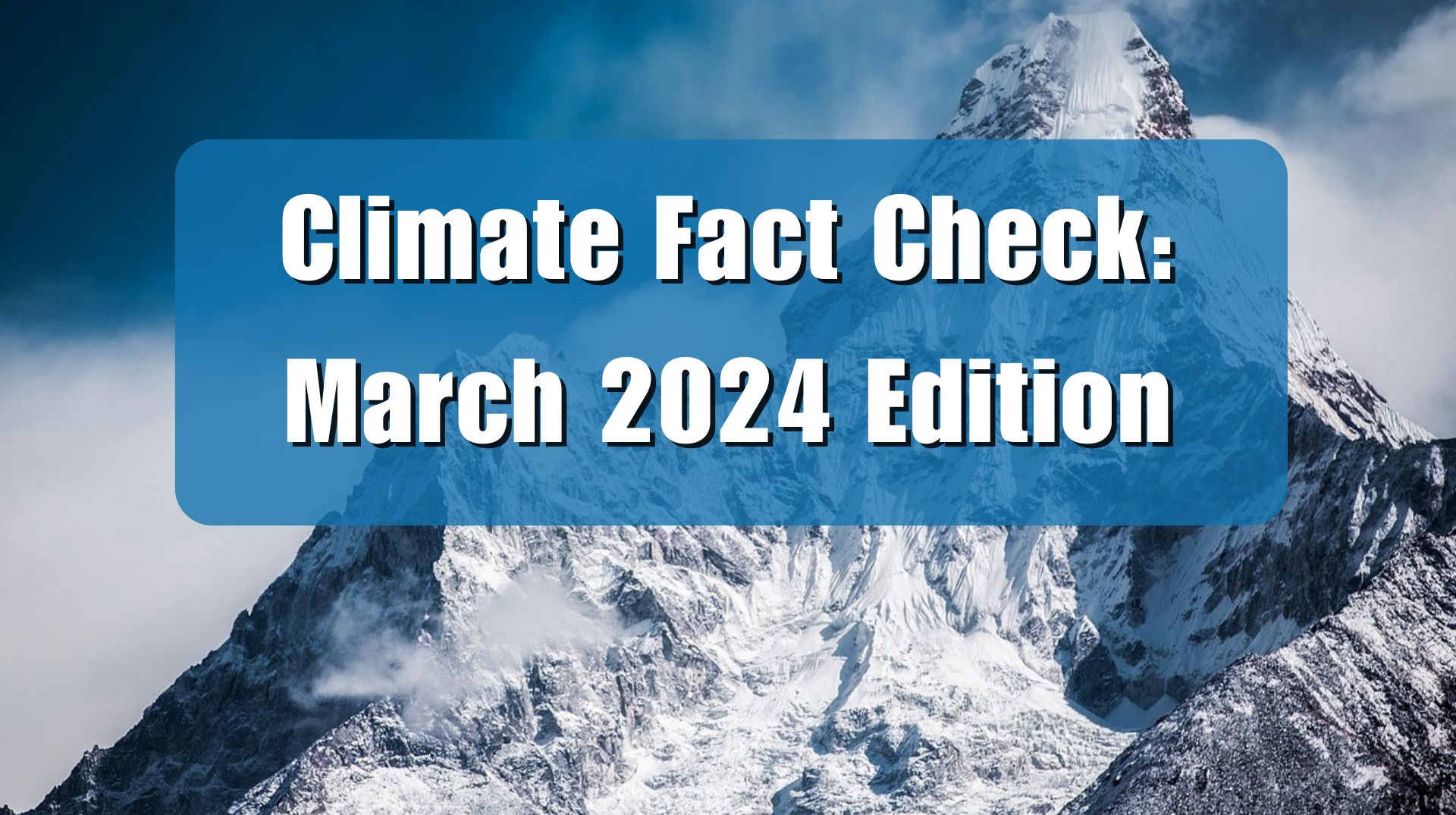A story posted on MSNBC by Kate Marvel, Ph.D., asserts both that climate change is worsening extreme weather events and making it weirder, and for the latter reason, adaptation to climate change is not really an option. Marvel is wrong on both counts. Data shows no evidence of increases in unnatural types of weather events, trends, or rapid shifts. Also, not only is adaptation to climate change the most effective option, it is in reality the only rational one if we care about being equitable to the poorest people on the planet.
In the MSNBC opinion piece, titled “The argument that we should just adapt to climate change is so misguided,” Marvel, a senior scientist with the climate activist organization Project Drawdown, after opening with a rehearsed litany of extreme weather events around the globe this summer and dispensing some ad hominem, referencing deniers, she gets down to the meat of her argument, writing:
Climate change is complicated. As my colleague Katharine Hayhoe often points out, it’s not so much global “warming” as it is global weirding. Climate change is making heat waves longer, hotter and likelier. Warm air is thirstier air, driving more evaporation and increasing the risk of drought. But all that water sucked up from the Earth’s surface has to go somewhere. As air gets warmer, it holds more water vapor, making extreme rainfall events even wetter. Warm water is hurricane food, and storms are getting stronger, dumping more rain and, aided by rising seas, surging farther inland.
Worse still, climate change increases the risk of compound extremes — that’s science for “double whammy” — multiple events that occur simultaneously or in quick succession.
Each of Marvel’s claims about weirding weather is refuted by real world data presented in numerous Climate Realism and Climate at a Glance articles: heat waves have not become hotter or more frequent; Droughts are not increasing in number or severity; hurricanes are not increasing in number or strength; and, yes, sea levels are rising, but not at a historically unusual rate, except in locations where subsidence, ground water withdrawal, and other factors are substantial contributing causes.
Nor as explained at Climate Realism, here and here, is there any evidence that multiple simultaneous events have begun to occur more frequently than they have globally in the past.
As factually challenged as Marvel’s assertions about climate and weather are, her claim that adaptation is not the appropriate response to climate change is equally misguided. Ending or sharply and rapidly reducing fossil fuel use to reduce emissions will make a bad situation worse. It will leave billions of people, inexcusably in poverty for decades to come, while making the lives of the poor and minorities in rich countries worse. And since Marvel’s group, and thus presumably she, wish for an equitable drawdown of emissions, they should note that the push for green energy is hardly “equitable;” in fact it is further widening the gap between wealthy elites, who are profiting handsomely from the government subsidized green energy transition, and average people.
Wealth is the greatest tool to fight climate change. It is what minimizes the damage done in developed countries in response to extreme weather events relatively to the harm that results in developing countries. Wealth, which has been built uniquely on fossil fuels, allows countries and people to harden infrastructure, have better building codes and water systems, raise sea walls and barriers, replace wetlands, develop emergency warning systems, produce more food than is consumed in a nation, and ensure modern medical care, and emergency services, that both anticipate and rapidly respond to the impacts of extreme weather.
The comparative difference between the damage done by a major hurricane striking the United States and Indonesia, and the recovery from it, is not that the wind speeds were higher and rainfall more intense in Indonesia than in the United States, it is that the United States is so much wealthier it can mitigate the damage from, adapt, and respond to such disasters more effectively and rapidly. The same is true for the extent of the damage done by an earthquake in the United States when compared to Afghanistan, and the recovery from them, for example. It is not that earthquakes shake harder in Afghanistan than in the U.S., it is that the infrastructure and building materials, and the emergency preparation and response is better in America. Fossil fuels, the energy and products they uniquely have provided, have made people in developed countries wealthier, and that wealth has made developed societies better able to anticipate, mitigate, and adapt to extreme weather events. Allowing the people of poor countries to better their lives by becoming wealthier through the use of fossil fuels is the quickest and surest way to “harden” their societies against the vagaries of climate change whatever its cause and in whatever form it takes.
Marvel instead counsels reducing carbon dioxide emissions, as if she is certain doing so will change the weather for the better. Even if we do that in the United States, turned off all the fossil fuel power plants, banning the internal combustion engines and gas appliances, it would make no difference to the trajectory of carbon dioxide emissions because fast growing developing countries like China and India are increasing their emissions (and global emissions accordingly) faster than we can cut our own. The government of the United States is harming its people with its policies limiting fossil fuel use, for no beneficial impact on the climate.
Marvel is as wrong about the value of government mandated U.S. emission cuts as Montana District Court Judge Kathy Seeley was about the impact of limiting Montana’s emissions. In a case invalidating a Montana law setting standards for evaluating requests for oil and gas permits, Seeley determined, “Montana’s emissions and climate change have been proven to be a substantial factor in causing climate impacts to Montana’s environment and harm and injury.”
This is false and if Seely believes it she is either stupid or willfully ignorant of the facts. No location’s or region’s greenhouse gas emissions can be tied, or “proven” in Seely’s words, to any particular weather or climate related harm in that location or region. Greenhouse gases mix in the atmosphere and don’t produce specific identifiable impacts tied to particular emissions from one location. And cumulatively Montana’s emissions are inconsequential. Montana’s CO2 emissions in 2021 amounted to approximately 0.6 percent (0.006) of total U.S. emissions, in other words just over ½ of one percent. Globally, Montana’s emissions have no measurable effect. They amount to 0.075 percent (O.00075), or slightly more than 1/13th of one percent of global emissions. Taking away Montana’s emissions entirely would have no impact whatsoever on weather or climate, nor would it prevent “harm and injury,” to the youths in Montana she misguidedly seems to feel will be helped by her overturning of a law.
Whether it is Montana in particular, or the United States as a whole, moving rapidly to net zero will have no impact on climate change, but will carry high costs in terms of human freedom and economic progress, especially for the poorest among us. By contrast, adaptation produces net benefits in terms of economic growth and freedom. Opinions should be informed by facts and evidence. Marvel’s MSNBC missive is lacking in both. As such, it is unclear what is really motivating Marvel’s harangue against adaptation, or MSNBC’s goal in publishing her ill-informed opinion piece.

















When was MSNBC right about anything important?
“Enquiring minds want to know.”
“Worse still, climate change increases the risk of compound extremes — that’s science for ‘double whammy’ — multiple events that occur simultaneously or in quick succession.”
What a great illustration of how snooty and condescending these useless fearmongers are. What has Marvel ever produced that makes people’s lives so much better that they are willing to pay for it voluntarily with their own money?